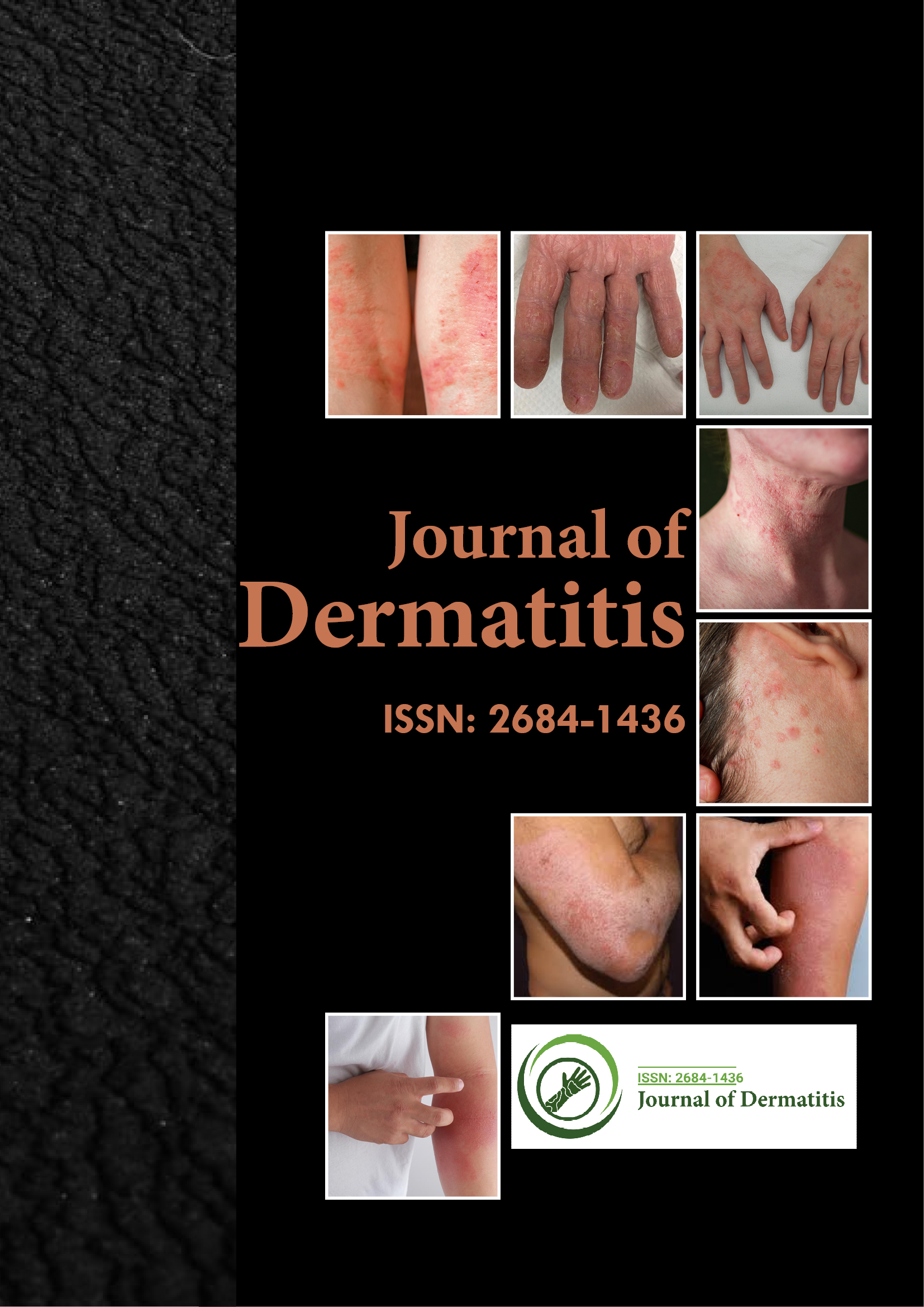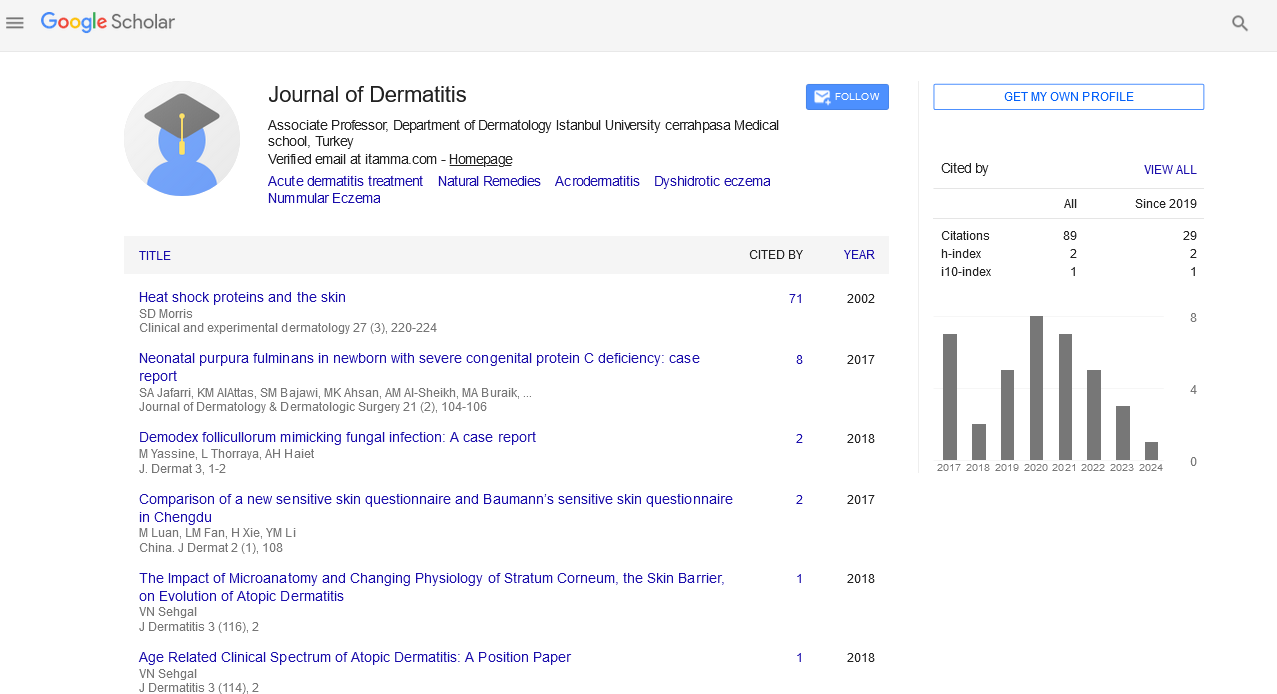Indexed In
- RefSeek
- Hamdard University
- EBSCO A-Z
- Euro Pub
- Google Scholar
Useful Links
Share This Page
Journal Flyer

Open Access Journals
- Agri and Aquaculture
- Biochemistry
- Bioinformatics & Systems Biology
- Business & Management
- Chemistry
- Clinical Sciences
- Engineering
- Food & Nutrition
- General Science
- Genetics & Molecular Biology
- Immunology & Microbiology
- Medical Sciences
- Neuroscience & Psychology
- Nursing & Health Care
- Pharmaceutical Sciences
Perspective - (2023) Volume 8, Issue 4
Aspects of Unidentified Ailments on Alopecia Areata Impacts on Thinning Hair
Tikai Wang*Received: 19-Jul-2023, Manuscript No. JOD-23-22371; Editor assigned: 21-Jul-2023, Pre QC No. JOD-23-22371 (PQ); Reviewed: 07-Aug-2023, QC No. JOD-23-22371; Revised: 14-Aug-2023, Manuscript No. JOD-23-22371 (R); Published: 21-Aug-2023, DOI: 10.35248/2684-1436.23.8.204
Description
Alopecia Areata is a perplexing and often enigmatic hair loss condition that affects millions of people worldwide. It is an autoimmune illness where the immune system of the body unintentionally assaults hair follicles, causing hair loss in various parts of the body. Despite its prevalence, the exact cause of Alopecia Areata remains unclear, leaving both medical professionals and affected individuals in a constant search for answers.
One of the distinctive features of Alopecia Areata is its unpredictable nature. Hair loss can occur suddenly and without warning, leading to the appearance of circular patches on the scalp or other hair-bearing areas, such as the eyebrows and beard. In some cases, the condition may progress to Alopecia Totalis or Alopecia Universalis, where all scalp and body hair is lost entirely. The emotional toll of this condition can be profound, as individuals may experience a loss of self-confidence and struggle to cope with the changes in their appearance.
Researchers have made significant strides in understanding the mechanisms behind Alopecia Areata. Family history can increase the risk of developing the condition, and certain triggers, such as stress, trauma, or viral infections, may exacerbate the immune response leading to hair loss. Moreover, it is believed that specific immune cells, known as T-cells, attack the hair follicles, but the reasons behind this misguided attack are still under investigation.
The impact of the condition on young individuals can be particularly challenging, as they grapple with self-image and social acceptance during critical developmental stages. Support from family, friends, and mental health professionals is essential in helping them navigate the emotional challenges associated with the condition.
Treatment for Alopecia Areata aims to halt or reverse hair loss and stimulate regrowth. However, due to its complex and elusive nature, there is no one-size-fits-all solution. Corticosteroids, either applied topically or injected into affected areas, are commonly used to reduce inflammation and suppress the immune response targeting hair follicles. Another approach involves topical immunotherapy, where chemicals are applied to the scalp to produce an allergic reaction, potentially redirecting the immune system away from hair follicles. Additionally, therapies like minoxidil and anthralin may promote hair regrowth in some cases.
Recent advancements in medical research have also explored the potential of Janus kinase (JAK) inhibitors, drugs that modulate the immune response, showing promising results in certain individuals with Alopecia Areata. Nevertheless, the efficacy of these treatments can vary widely from person to person, and not all individuals respond positively.
In coping with Alopecia Areata, support groups and counseling can be invaluable for individuals struggling with the psychological and emotional challenges of hair loss. These resources provide a safe space for sharing experiences, building resilience, and fostering a sense of belonging.
In conclusion, Alopecia Areata remains a complex condition, leaving both those affected and medical experts searching for effective solutions. Its unpredictable nature and emotional impact on individuals necessitate a comprehensive approach to treatment and support. As research continues to unravel the problem behind this enigmatic condition, greater awareness, understanding, and can go a long way in helping individuals with Alopecia Areata navigate their unique hair loss journey with strength and confidence.
Citation: Wang T (2023) Aspects of Unidentified Ailments on Alopecia Areata Impacts on Thinning Hair. J Dermatitis. 8:204.
Copyright: © 2023 Wang T. This is an open-access article distributed under the terms of the Creative Commons Attribution License, which permits unrestricted use, distribution, and reproduction in any medium, provided the original author and source are credited.

